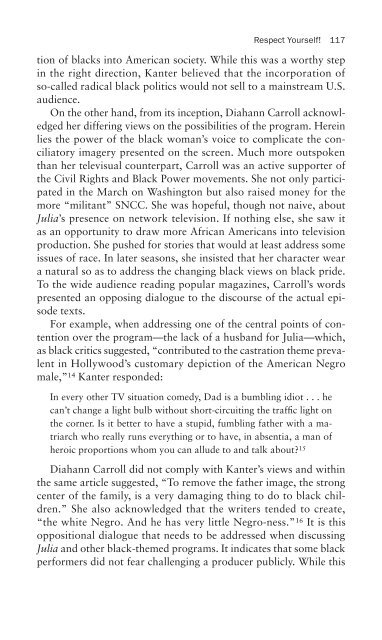Revolution Televised.pdf
Revolution Televised.pdf
Revolution Televised.pdf
You also want an ePaper? Increase the reach of your titles
YUMPU automatically turns print PDFs into web optimized ePapers that Google loves.
Respect Yourself! 117<br />
tion of blacks into American society. While this was a worthy step<br />
in the right direction, Kanter believed that the incorporation of<br />
so-called radical black politics would not sell to a mainstream U.S.<br />
audience.<br />
On the other hand, from its inception, Diahann Carroll acknowledged<br />
her differing views on the possibilities of the program. Herein<br />
lies the power of the black woman’s voice to complicate the conciliatory<br />
imagery presented on the screen. Much more outspoken<br />
than her televisual counterpart, Carroll was an active supporter of<br />
the Civil Rights and Black Power movements. She not only participated<br />
in the March on Washington but also raised money for the<br />
more “militant” SNCC. She was hopeful, though not naive, about<br />
Julia’s presence on network television. If nothing else, she saw it<br />
as an opportunity to draw more African Americans into television<br />
production. She pushed for stories that would at least address some<br />
issues of race. In later seasons, she insisted that her character wear<br />
a natural so as to address the changing black views on black pride.<br />
To the wide audience reading popular magazines, Carroll’s words<br />
presented an opposing dialogue to the discourse of the actual episode<br />
texts.<br />
For example, when addressing one of the central points of contention<br />
over the program—the lack of a husband for Julia—which,<br />
as black critics suggested, “contributed to the castration theme prevalent<br />
in Hollywood’s customary depiction of the American Negro<br />
male,” 14 Kanter responded:<br />
In every other TV situation comedy, Dad is a bumbling idiot . . . he<br />
can’t change a light bulb without short-circuiting the traffic light on<br />
the corner. Is it better to have a stupid, fumbling father with a matriarch<br />
who really runs everything or to have, in absentia, a man of<br />
heroic proportions whom you can allude to and talk about? 15<br />
Diahann Carroll did not comply with Kanter’s views and within<br />
the same article suggested, “To remove the father image, the strong<br />
center of the family, is a very damaging thing to do to black children.”<br />
She also acknowledged that the writers tended to create,<br />
“the white Negro. And he has very little Negro-ness.” 16 It is this<br />
oppositional dialogue that needs to be addressed when discussing<br />
Julia and other black-themed programs. It indicates that some black<br />
performers did not fear challenging a producer publicly. While this

















